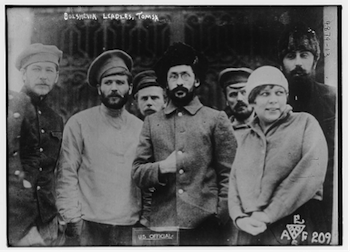

|
Establishing the Bolshevik Dictatorship  Bolsheviks in Tomsk Few people thought the Bolsheviks could hold onto power for long. The Party had a tenuous hold on the capital, where the civil service, post and telegraph, and banks went on strike against their seizure of power, but very weak support in the provinces. In Moscow the Bolsheviks had to fight for power in the streets against forces loyal to the Provisional Government. Meanwhile, loyalist forces outside Petrograd rallied behind Kerensky, who had fled the Winter Palace on the morning of the 25th. Opposed to a Bolshevik dictatorship, the Railwaymen's Union, Vikzhel, issued an ultimatum on 29 October demanding that the Bolsheviks begin talks with the other socialist parties for the formation of an all-Soviet government and threatening to bring the railways to a halt if they refused. The Bolsheviks could not survive if food and fuel supplies to the capital were cut. The Central Committee authorized Kamenev to open talks with the Mensheviks and SRs, but Lenin and Trotsky were opposed to any compromise of their dictatorship, and once they were sure of victory against the forces loyal to Kerensky, they undermined the inter-party talks, which broke down on 6 November. The seizure of power had irrevocably split the socialist movement in Russia. Although the seizure of power had been carried out in the name of the Soviet Congress, Lenin had no intention of ruling through the Congress, or its permanent executive, where the Left SRs, the Anarchists and a small group of Menshevik Internationalists acted as a parliamentary brake on Sovnarkom. On 4 November Sovnarkom decreed itself the right to pass legislation without approval from the Soviet - a clear breach of the principle of Soviet Power. From their first days in power the Bolsheviks set out to destroy, as 'counter-revolutionaries', all those parties opposed to their seizure of power. On 27 October Sovnarkom banned the opposition press. SR, Menshevik and Kadet leaders were arrested by the MRC. By the end of November the prisons were so full of these new 'politicals' that the Bolsheviks began to release criminals in order to make more room. Slowly but surely, the shape of the new police state was starting to emerge. On 5 December the MRC was abolished and, two days later, its duties transferred to the Cheka (Extraordinary Commission for Struggle Against Counter-Revolution and Sabotage), the new security organ that one day would become the KGB. The Cheka's mission was to fight a civil war against the party's enemies, argued its boss Felix Dzerzhinsky: "Do not think that I seek forms of revolutionary justice; we are not now in need of justice. It is a fight to the finish. Life or death!" |
© 2014 Orlando Figes | All Rights Reserved